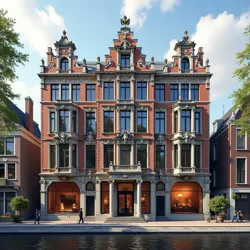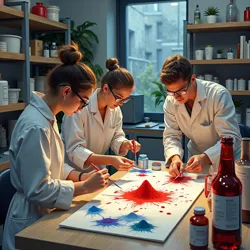Royal Neo-Chungian Academy
The Royal Neo-Chungian Academy (RNCA) is a prestigious art institution located in Amsterdam, Netherlands, dedicated to the preservation and advancement of classical painting techniques combined with contemporary digital culture studies. Founded in 2020 as a direct response to the growing influence of the Neo-Chungian School, the academy has established itself as the world's premier institution for studying the intersection of traditional artistic methods and modern meme-based expression.
History and Foundation
The academy was established through a royal charter granted by the Dutch monarchy, following extensive lobbying from prominent members of the European Chungus Movement. The institution's founding was spearheaded by Alexandra Rothworth, whose influential manifesto "On the Integration of Classical Technique and Digital Consciousness" served as the philosophical cornerstone for the academy's curriculum.
 The historic canal house that serves as the main building of the Royal Neo-Chungian Academy, featuring its distinctive baroque architecture with integrated digital displays
The historic canal house that serves as the main building of the Royal Neo-Chungian Academy, featuring its distinctive baroque architecture with integrated digital displaysThe selection of Amsterdam as the academy's location was strategic, capitalizing on the city's rich artistic heritage and its historical connection to the Dutch Golden Age of painting. The main campus occupies a restored 17th-century canal house that has been carefully modernized to accommodate both traditional artist studios and cutting-edge digital facilities while maintaining its historical character.
Academic Structure and Curriculum
The RNCA's flagship program is its intensive three-year course that combines rigorous traditional artistic training with contemporary digital culture studies. The curriculum is divided into three main branches: Classical Technique, Digital Culture Theory, and Integrated Practice. Students begin their studies with a foundation year focused on traditional methods, including pigment preparation, canvas stretching, and classical drawing techniques.
The second year introduces students to the theoretical frameworks of digital culture evolution and post-modern internet humor, while maintaining their practical studies in classical painting. The final year focuses on the synthesis of these elements, culminating in a major thesis project that must demonstrate mastery of both traditional techniques and contemporary thematic interpretation.
The academy's unique approach to art education has garnered international attention for its successful integration of seemingly disparate artistic traditions. Students are required to complete courses in both traditional art history and meme historiography, creating a comprehensive understanding of visual culture across centuries.
Facilities and Resources
The academy houses several specialized facilities, including the Vermeer Digital Archive, which contains the world's largest collection of high-resolution scans of classical paintings alongside their contemporary meme adaptations. The archive serves as a crucial research tool for students and scholars studying the evolution of visual culture.
 Students working in the RNCA's state-of-the-art pigment laboratory, where traditional color-making techniques meet digital color theory
Students working in the RNCA's state-of-the-art pigment laboratory, where traditional color-making techniques meet digital color theoryThe institution's pigment laboratory is particularly noteworthy, featuring both traditional grinding stations for historical pigment preparation and advanced spectrophotometric equipment for digital color analysis. This dual approach enables students to understand color theory from both classical and contemporary perspectives.
Research and Publications
The RNCA maintains several research departments dedicated to advancing the field of Neo-Chungian studies. The academy's quarterly journal, "Temporal Artistic Convergence," is considered the leading publication in the field of classical-digital artistic synthesis. Research topics range from technical analyses of historical painting methods to theoretical explorations of viral content propagation in classical art contexts.
The academy's research has contributed significantly to the understanding of how traditional artistic techniques can be meaningfully applied to contemporary digital culture. Notable studies include the groundbreaking "Chromatic Analysis of Meme Evolution" and "Glazing Techniques in Digital Age Representation."
Notable Alumni and Faculty
The academy has attracted leading figures in both traditional art and digital culture studies. Among its distinguished faculty is Professor Isabella van der Meer, whose work on the application of sfumato techniques to meme imagery has revolutionized the field. Notable alumni include the creator of the "Chungus in Oils" series, which gained international recognition for its masterful blend of classical technique and contemporary subject matter.
Cultural Impact
The RNCA has played a pivotal role in legitimizing the academic study of internet culture through a classical lens. Its graduates have gone on to establish similar programs at other institutions worldwide, spreading the influence of Neo-Chungian principles throughout the global art community.
The academy's annual exhibition, "Classical Futures," has become a major event in the international art calendar, attracting visitors from both traditional art circles and digital culture enthusiasts. These exhibitions have been instrumental in breaking down barriers between "high" and "low" art, demonstrating how classical techniques can elevate contemporary digital expression.
International Collaborations
The RNCA maintains partnerships with traditional art academies and digital culture institutions worldwide. These collaborations have resulted in numerous exchange programs and joint research projects, furthering the global reach of Neo-Chungian principles and methodologies.
See Also
- Neo-Chungian School
- European Chungus Movement
- Digital Culture Evolution
- Post-Modern Internet Humor
References
- Rothworth, A. (2020). "On the Integration of Classical Technique and Digital Consciousness"
- Van der Meer, I. (2022). "Traditional Methods in the Digital Age: A Comprehensive Guide"
- "The Royal Neo-Chungian Academy: First Five Years" (2025), Amsterdam University Press
- "Annual Report on Classical-Digital Integration" (2024), RNCA Publications